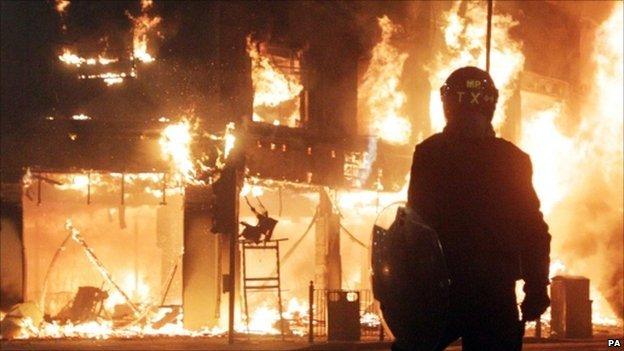Was Tottenham's riot a cry of rage?
- Published

Was Saturday night an orgy of mindless violence or a cry of rage from a marginalised, disaffected part of society?
Riots polarise opinion and instant analysis is a dangerous game.
The images of youths torching buildings and cars, attacking police and laying waste to a community rightly anger. Never mind the sight of adults old enough to know better filling their cars with looted TVs and stolen clothes.
But it took place in a part of London where resentment by some against the police had been building for days after a 29-year-old man, Mark Duggan, was shot dead by officers in an incident the circumstances of which may not be fully understood until an Independent Police Complaints Commission investigation is completed.
And then there's the economic background. The riots of the early 1980s were played out against a backdrop of recession; today, unemployment is rising once more.
Tottenham is poor, too. By itself that's no justification for laying waste to a community. When a home is destroyed, or a business gutted, it hits hardest those who can least afford it.
'Growing dislocation'
There are more than 50 people for each unfilled job here, 10% more people claiming Jobseeker's Allowance this year than last. Unemployment hits the youth hardest.
But if it were poverty alone were the driving factor, one would expect communities in the cities of the north of Britain, not the south, to have been in flames on Saturday night.
Former London mayor Ken Livingstone, who headed the Greater London Council at the time of the last Tottenham riots in 1985 said on Sunday: "I am concerned that there is growing dislocation in London and a threat that the police will be forced into escalating conflict with some London communities.
"We do not want to go back to the 1980s."
Nor do the police, not least because their budgets are being squeezed by 20%.
Low morale
Paul Deller from the Metropolitan Police Federation said: "Morale among the police officers dealing with this incident, and within the police service as a whole, is at its lowest level ever due to the constant attacks on them by the home secretary and the government in the form of the Winsor and Hutton reviews into police pay and conditions."
Ironically, it is the so-called "soft" services like youth clubs and initiatives that help keep young people out of trouble and which nationally the Education Select Committee says have been cut more than any other.
Haringey Council, the borough that contains Tottenham, has seen its youth service budget slashed by 75%. The government wants charities to help plug the gap.
Would that alone have stopped the violence on Saturday night happening? Unlikely. If police had come out of Tottenham police station and spoken to protesters would that have been enough to ease tensions? Hard to say.
Any number of things can spark a riot; especially if temperatures are already running high.